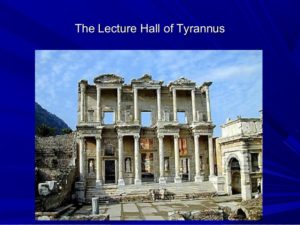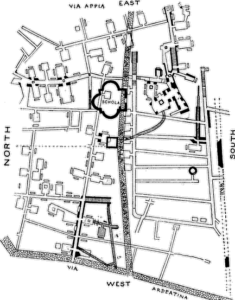[Greek] σχολή (scholē): school, a lecture hall, place for leisure; Acts 19:8-9

Background Information:
Greek Hellenism: This term means leisure, rest, enjoyment, discussion, lecture, school, learning, and office. Plato’s Apology 36d states “Now what is fitting for a poor man who is your benefactor, and who needs leisure to exhort you?” Euripides’ Heracles 725 states “Follow me, servants, that one may joyfully put an end to this delay of work.” Plato’s Laws 820c states “For students who are not absolutely worthless it is necessary to examine these and to distinguish the two kinds, and, by proposing such problems one to another, to compete in a game that is worthy of them. Xenophon’s Cyropaedia 7.5.42 states “However, if great success is to have such consequences that a man is not able to have leisure for himself nor time to enjoy himself with his friends, I am ready to bid farewell to that sort of happiness.”

A schola built over a cemetery
Roman burial societies (collegia funeratica): Roman laws were very strict in regard to people associating into groups and associations. An exception was made for burial societies (collegia funeraticia). These societies were created to provide a decent funeral and burial place for their loved ones. An inscription was discovered of a Roman Senate decree: “It is permitted to those who desire to make a monthly contribution for funeral expenses to form an association” It was the custom to celebrate on the occasion of a feast each year. Special buildings were erected to hold these feasts, as well for other meetings. These societies received gifts from rich members or patrons. It was quite possible that they gathered here for the breaking of the bread and the prayers (Mass).
Scola: The schola took the shape of a square lodge room with three apses (vaults). This structure was built over the catacombs. The schola above the Catacombs of Callixtus was excavated at the time of Pope Fabianus (236-250 AD). The original schola was covered by a wooden roof and had no façade or door. In the year 258 Pope Sixtus II, presiding over a meeting, was murdered by the persecution under Emperor Valerian. The schola was destroyed. Half a century later, Emperor Constantine restored the schola to its original shape with the addition of a vaulted roof and façade. Later the schola was changed into a church and dedicated to Sixtus. It became a great place of pilgrimage.
New Testament:
“He entered the synagogue, and for three months, debated boldly with persuasive arguments about the kingdom of God. But some in their obstinacy and disbelief disparaged the Way before the assembly, he withdrew and took his disciples with him and began to hold daily discussions in the lecture hall of Tyrannus.” Acts 19:8-9
Paul preaching in Ephesus:
Where did Paul preach? As a Jew, Paul makes the first offer of the gospel to the Jews in the synagogue. Paul hopes to ingratiate himself with them. He hopes to win them over to his gospel message. When there were no Christian assemblies yet formed, Paul frequented the Jewish assemblies.
What did Paul preach to the Jews? Paul preached the things concerning the kingdom of the Messiah, which the Jews were in expectation of.
How did Paul preach to the Jews? Paul preached argumentatively. He disputed, gave scripture reasons for what he preached. He answered objections. He put questions to them and received their answers. He persuaded, preached undauntedly, and spoke boldly.
How successful was Paul? There were some Jews whom were persuaded to believe in Christ. Yet many Jews continued their opposition to Paul’s arguments. Many Jews were hardened and believed not. They soon grew weary of him. When their opposition grew more obstinate, Paul left the synagogue.
Where did Paul go? He went to the lecture hall (school) of Tyrannus. Instead of preaching every Sabbath day, Paul preached and lectured every day. Both Jews and Greeks attended his ministry. Some considered this place a divinity school of the Jews, the house of enquiry, a philosophy school of the Gentiles, or a place of leisure.
Conclusion:
School
From this comes the word school. However, the present day idea of a classroom did not yet exist in this early point in history.
